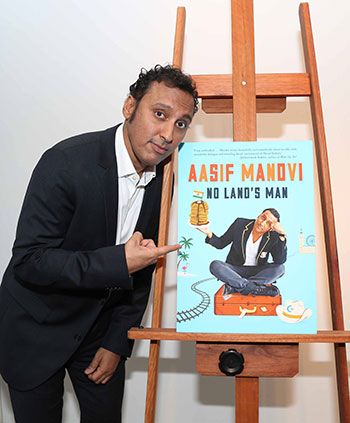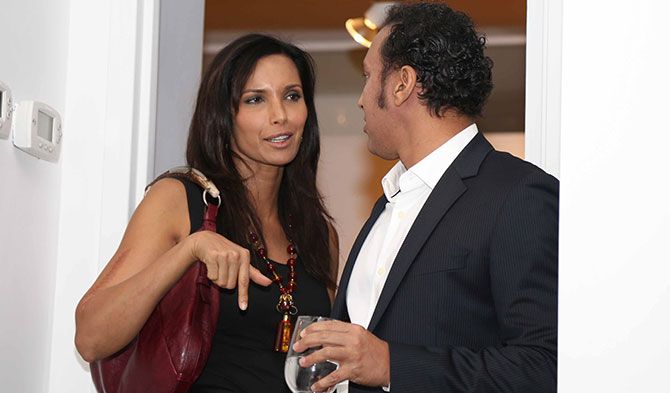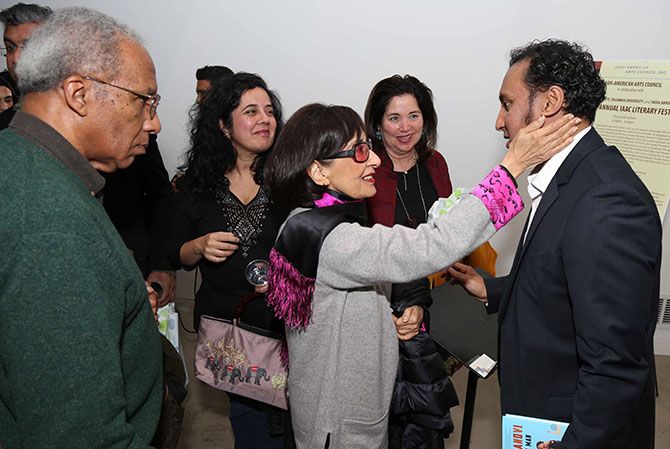 'We would always come back from auditions and ask one other... did they ask you to patank?' says Indian-American actor Aasif Mandvi at the launch of his memoir, No Land's Man.
'We would always come back from auditions and ask one other... did they ask you to patank?' says Indian-American actor Aasif Mandvi at the launch of his memoir, No Land's Man.
'My father moved our family to the United States because of a word.' Aasif Mandvi is reading from his memoir, No Land’s Man, at the launch of the book in New York, November 3. 'It was a word whose meaning fascinated him. It was a singularly American word, a fat word, a word that could only be spoken with decadent pride. That word was... Brunch!'
Now he is switching to his father, saying it in a slight singsong tone. "'The beauty of America,' he would say, 'is they have so much food that, between breakfast and lunch, they have to stop and eat again.'"
The audience at the Aicon art gallery in Manhattan are laughing their guts out. So are Mandvi’s father, Hakim Mandviwala, and sister, Shabnam. They have come from Tampa, Florida, where Mumbai-born Aasif spent many years in high school and college, having moved with his family from Bradford in England at age 16.
There is more laughter to come.
Mandvi writes about how his father got T-shirts made with the logo International House of Patel and gave to every one in the family to wear when they visited the International House of Pancakes. Even his parents who were visiting from India had to wear the shirts. The senior Mandviwala hoped the shirts would be seen as a sign of loyalty to IHOP and would secure the family a discount.
There were a few discounts but for Aasif, who had to wrestle with identity crisis and the spread of pimples, there was nothing but embarrassment.
As he reads more funny stories from his book, the audience roars in delight.
Aaron Shivadasani, the honcho of Indo American Arts Council, who hosted the event as part of a literary conference that officially kicks off on November 7 in New York -- featuring Salman Rushdie interviewed by Professor Akeel Bilgrami, director, South Asia Institute, Columbia University -- looks on with a broad smile.

Mandvi, famous for playing a Muslim correspondent in the hit Daily Show devised by Jon Stewart, is an Obie-winning writer (the Village Voice newspaper holds the Off-Broadway Theater Awards every year where it honours theatre artists and groups in New York City). He has also acted in the autobiographical play, Sakina’s Restaurant.
He has played small roles in over 30 films and major parts in films like Airbender. He is writing and producing The Brink, an HBO series in which he he'll star with Jack Black and Tim Robbins.
He has also seen quite a bit of success in New York theatre. He was a wily peddler in the musical, Oklahoma!. Last year he played the lead, Amir, in Ayad Akhtar’s Pulitzer-winning Disgraced at a Lincoln Center theatre in New York.
Mandvi reads several passages from his book; musician Sid Khosla of Goldspot and a friend guitarist provided nostalgic songs in between the reading. One of them concerns Khosla’s mother who, after having sent him to India to be brought up by his grandmother, sends him a tape full of songs.
Anything Mandvi reads gets a warm welcome. He describes the brunch which made his father very happy.
"A stack of pancakes eight inches high with five kinds of syrup: Maple, caramel, chocolate, honey and strawberry. Eggs any style. Biscuits lathered in whipped butter. Muffins, hash browns and as much coffee as you could drink. Orange, grapefruit and tomato juice. French toast and a side of extra crispy turkey bacon and/or sausage (because, after all, we were Muslims). All for a measly $7.95.
"Brunch au Akbar!," he adds reading from the book.
The book also has many poignant and a few sad passages -- of his childhood in England, where he was called Curry Pot by fellow students; his early years in New York as an actor, doing commercials and forced by circumstances to play the stereotypical Indian with a heavy accent. The truth was that though, he grew up very familiar with his parents’ Indian accent, he did not have one and it was not easy for him to fake a desi accent.
But he learnt to "patank," he later tells us.
"Patanking is a word that actress Sakina Jaffrey first introduced to me and soon desi actors were using it in the early ’90s, in New York," he remembered.
"Patanki-ing was basically the sound of mimicking an Indian accent to a non-Indian ear. It was like, you know... you bobble your head and you go, patank... patank... patank... patank... patank. And so we would always come back from auditions and ask one other... did they ask you to patank? What is meant was a disembodied accent of an Indian caricature that was devoid of any humanity or any context. The ad makers would just ask you to come in, put a turban on and do an accent.
"They would ask me if I knew to charm snakes. These were what a lot of my experiences as a young actor in New York were when I first got here."

At the end of the reading, he is asked by a reader what was it is like to write a memoir as compared to his other work.
He says that, when he was working on Sakina's Restaurant, he would play the scenes in front of an audience, mostly friends and family members, and then write and tweak the stage play.
Writing the memoir was a solitary exercise compared to writing a play, though he would call friends from time to time and read out passages. Some of them were in the middle of childbirth, he adds smiling, and they were not too pleased at being disturbed. Some got so hassled that they are not talking to me anymore, he continues with mirth.
He has been at work on the book for about three years, he says.
Another reader wants to know if his family has read No Land’s Man.
Mandvi, whose mother Fatima died a few years ago, says his father and sister read the book.
'What is the big fuss, who wants to read stories about me? I don’t care for them myself,' he tells his son.
But there is pride in Hakim Mandviwala’s eyes when he looks at his son. And when a reader asks Mandviwala to sign the book, he beams and hugs the reader.
Photographs: Paresh Gandhi




.jpg)






 © 2025
© 2025